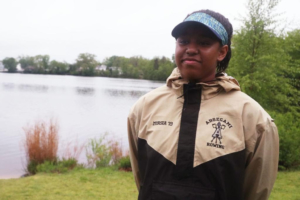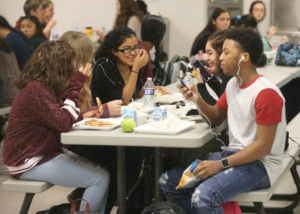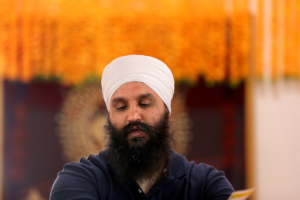https://www.splcenter.org/hatewatch/2018/05/03/anti-lgbt-roundup-events-and-activities-5318
American Family Association*
The American Family Association (AFA)is protesting a move by the Boy Scouts of America (BSA) to allow girls into its ranks, though the BSA’s announcement came in October of last year.
According to BSA, girls can now start participating in Cub Scouts and BSA will begin implementing a program that allows older girls to advance and earn Eagle Scout rank.
Ed Vitagliano, AFA’s executive vice president, acknowledged in a video of AFA’s “Reason and Company” program posted April 24 that the decision is months-old, but that the BSA is just now starting to get girls into its programs. According to Vitagliano, it’s “part of the ongoing war against the Judeo-Christian worldview, the way God has established mankind, male and female.” The BSA, he argued, is an example of how “this thing” (the ongoing war) unfolds:
They first began to allow homosexuals, and homosexual troop leaders, and then transgenders [sic], and now girls in with boys because the secular progressive, the materialistic worldview based in evolution says there’s really no difference between boys and girls, and so we don’t need to — we see the same thing with Target, allowing men into women’s restrooms and changing areas — this is part of a larger war against God and His divine order.

AFA’s Ed Vitagliano, left, and Tim Wildmon (screenshot from “Reason and Company,” Apr. 24, 2018)
AFA has been protesting Target’s trans-inclusive policy for about a year. This includes boycotting the retailer, a tactic AFA has historically used against LGBT-inclusive companies. AFA often insinuates that trans woman are men, and that trans-inclusive store policies will allow male sexual predators into women’s restrooms and other women’s public facilities, a harmful myth promulgated by the anti-LGBT right.
Family Research Council*
The Family Research Council (FRC) is a fan of new secretary of state Mike Pompeo (see below), and held a panel discussion May 2 titled “Religious Liberty and National Security: Opportunities for Secretary Pompeo.”
The panelists were Thomas Farr, president of the Religious Freedom Institute and Robert Destro, a professor of law at Catholic University of America’s Columbus School of Law. He is also co-director of the Iraqi Kurdistan Religious Freedom Project.
FRC’s description of the event states that “a developing body of evidence suggest that the presence of religious freedom is significantly connected to security, stability, and prosperity” and claims that security at home “seems increasingly related to religious freedom elsewhere.”
FRC president Tony Perkins hosts a daily radio show, “Washington Watch.” Guests from April 14 through May 2 included attorney James Trusty (formerly with DOJ); columnist Terry Jerry; Rep. Mark Walker (R-NC); Sam Brownback (Ambassador-at-Large for Religious Liberty); Rep. Andy Harris (R-MD); columnist and author Matt Walsh; Chris Mitchell (Christian Broadcasting Network); Hiram Sasser (general counsel, First Liberty); Sen. James Lankford (R-OK); former congresswoman Michele Bachmann; Rep. David Brat (R-VA); Emery McClendon (Project 21); Pastor Dean Haun (First Baptist Church, Morristown, TN); Avi Melamed (former Israeli intelligence); Matthew Heiman (National Security Institute visiting fellow); Jonathan Keller (California Family Council); Nick Salyers (Champion Tribes); Caroline Glick (Jerusalem Press); author Joel Rosenberg; Pastor Naim Khoury (First Baptist Church of Bethlehem); Pastor Jack Hibbs (Calvary Chapel Chino Hills, CA); Frank Gaffney (Center for Security Policy*); former actress Tina Marie Griffin; Rep. Ron Estes (R-KS); Pastor Ronnie Floyd (president, National Day of Prayer); Ken Cuccinelli (Senate Conservatives Fund); Tim Graham (NewsBusters); George Barna (Barna Research Group); Rep. Steve King (R-IA); author Gordon Chang; columnist Terry Jeffrey
Family Policy Institute of Washington
The Family Policy Institute of Washington (FPIW; located in Bellevue, Washington) is hosting its annual dinner May 4 with guest speaker Robert George, Princeton professor of law and longtime anti-LGBT activist.
George is chairman emeritus of anti-LGBT group the National Organization for Marriage and is also one of the three drafters of the anti-choice and anti-LGBT “Manhattan Declaration,” a theocratic manifesto that calls for Christians to disobey laws they disagree with, seeks to ban same-sex marriage and disallows recognition of any kind of civil union between same-sex couples.
George, who served as chairman of the U.S. Commission on International Religious Freedom, is a senior fellow at the Witherspoon Institute, which provided nearly $700,000 to anti-LGBT sociology professor Mark Regnerus for his debunked 2012 study. In addition, George launched the American Principles Project in 2009, a group that worked to derail the Common Core educational standards, including using conspiratorial turns such as warning about “dark forces” behind the standards. He has also referred to transgender identity as “absurd” and “superstitious.”
FPIW is extremely active in anti-choice and anti-LGBT state and local politics. It has battled domestic partnerships, access to birth control for poor women and a telemedicine bill, claiming that it would allow “webcam abortions.” FPIW president Joseph Backholm has compared same-sex marriage to two siblings re-defining their bond and said that “tolerance is not something to be pursued.”
FPIW is also behind the anti-trans “Just Want Privacy” campaign, which gathered signatures in 2016 for Initiative 1515. The initiative would have repealed a state human rights commission law and made it legal for businesses to discriminate against trans people by allow denying them access to restrooms and locker rooms in accordance with their gender identity. The measure didn’t make the ballot.
Focus on the Family
Focus on the Family (FOTF) recently defended its 2016 shift in status to be classified by the IRS as a “church” after Right Wing Watch (RWW) posted about it again April 17 after initially posting an article in February. RWW delved into greater detail in the April 17 post, revealing documents that indicated the organization was seeking to avoid the Affordable Care Act’s insurance mandate on coverage for contraception and other regulations.
The documents indicated that the IRS was initially skeptical of FOTF’s claims with regard to being classified as a church, but relented after FOTF’s attorneys insisted the organization met the criteria for church status and that a denial would violate the First Amendment. In a letter attorneys wrote to the IRS, they claim that the daily work of FOTF “is worship” and FOTF believes that all its members “are ministers.”
FOTF is now exempt from some retirement plan regulations that apply to most nonprofits, and no longer has to pay unemployment taxes or provide unemployment benefits to employees it fires. Churches are also exempt from filing publicly available tax documents with the IRS and are protected from audits.
In response to RWW’s April 17 article, FOTF spokesman and vice president of communications Paul Batura told the Christian Post that the change in status was to protect the privacy of donors in a “hostile environment” for groups like theirs, contrary to what the organization told the IRS its reasons were for seeking church status. “[I]f some of our critics object,” Batura said, “they should take it up with Congress.”
Meanwhile, in other FOTF news, ThinkProgress revealed that FOTF Africa received a grant from the Trump administration in September 2017 to combat HIV/AIDS in South Africa through a religious program that pressures kids to pledge they will abstain from sex until marriage. The organization received nearly $50,000 under the President’s Emergency Plan for AIDS Relief (PEPFAR) from the State Department’s Office of the U.S. Global AIDS Coordinator to implement its global abstinence-only purity pledge program, ThinkProgress reported, called “No Apologies,” to 7,000 “learners” in 90 schools in South Africa. Studies demonstrate that abstinence programs do not work in the prevention of sexually transmitted diseases or pregnancy (see here, here, and here).
Liberty Counsel*
On April 18, Mary McAlister, senior litigation counsel for Liberty Counsel, appeared on right-wing activist Cliff Kincaid’s “USA Survival” program claiming that sex ed programs in public schools are “satanic,” according to Right Wing Watch. McAlister’s Twitter biography states that she is working to “stop the satanic sexualization of our children and the destruction of the family.”
McAlister and Kincaid were discussing the right-wing “Sex Ed Sit Out” effort organized by religious right activist Elizabeth Johnston (“Activist Mommy”), among others, which encouraged parents to take their kids out of school April 23 to protest what Johnston perceives as “graphic, gender-bending sex education.”
Johnston posted a video to her Facebook page in March titled “They Are Coming for Our Children.” In the accompanying text, she claimed that “LGBT activists are brainwashing children through graphic sex ed, medicating our children against our will, stealing our children through the courts, and sabotaging our children’s sporting events. When will we protect our children?”
Liberty Counsel, like other Christian Right anti-LGBT groups, believes that sex ed in schools “sexualizes” children and is a vehicle to a host of perceived ills, including “recruiting” children into homosexuality and being transgender, part of the so-called “gender ideology” conspiracy theory that right-wing groups have manufactured in an attempt to further marginalize LGBT people and curtail reproductive health efforts.
Voice of the Voiceless
“Ex-gay” group Voice of the Voiceless has partnered with organizers of Freedom March: A Celebration of Freedom from Homosexuality and Transgenderism, according to NBC.
This event is slated for Saturday, May 5 in Washington, D.C., and the featured speaker is anti-LGBT “Activist Mommy” Elizabeth Johnston, who told the Christian Post that the Freedom March will be attended by all kinds of people around the globe who have known the destruction of sexual sin and gender confusion. “They know what it’s like to want help and freedom from the emptiness and addictions of the gender-confused lifestyle, but not know where to turn,” then added that she hopes meaningful, loving relationships are formed.
Voice of the Voiceless has linked homosexuality to pedophilia while founder Christopher Doyle has claimed that anti-LGBT laws in African countries are the fault of LGBT people themselves and denies that violence takes place against them and instead, they’re just “playing the victim card.” Doyle has also referred to homosexuality as a “maladaptive condition” and in one interview stated that, “I have no issues with gay people per se. I do have issues with homosexuality and the homosexual activists’ agenda.”
World Congress of Families*/International Organization for the Family*
Larry Jacobs, the managing director for WCF/IOF, died April 30 after suffering a stroke. He was 50, according to family on social media.
Jacobs’ bio on LinkedIn notes that he managed the operations, public relations, fundraising and publications for IOF/WCF and that he organized international “pro-family” conferences (i.e. WCF gatherings) in the U.S., Mexico, the Netherlands, Spain, Poland, Russia and Australia. He is also listed as the CEO and founder of Jabez Consulting, which according to a different bio, is a not-for-profit organization that assists businesses, Christian organizations and so-called “pregnancy centers” (anti-abortion) with medical services, strategy, and fundraising.

Larry Jacobs at the 2017 WCF gathering in Budapest (screenshot from IOF website).
Jacobs has been a large part of WCF and its work in a variety of international arenas, including the United Nations (where it holds consultative status with the Economic and Social Council) and with local groups and governments to implement exclusionary policies and views with regard to LGBT people and reproductive healthcare in countries around the world.
WCF is particularly busy in Russia and Eastern Europe and was launched in 1997 after a meeting in Russia between the group’s founder and two Russian intellectuals. In 2012, WCF helped found FamilyPolicy.ru, a network of hard right organizations in Russia.
Mother Jones noted in 2014 the influence that WCF has had on countries like Russia and others in Eastern Europe where anti-LGBT legislation is on the rise, and that anti-LGBT laws in Russia seemed to mirror the rise of WCF’s work in the country. When asked whether WCF’s work had contributed to this pattern, Jacobs responded, “Yes, I think that is accurate.” Jacobs told right-wing Christian radio host Rick Wiles in 2013, shortly before the Russian Duma passed the ban on so-called “gay propaganda,” that the ban was a “great idea” as it would prevent LGBT people from “corrupting children.
The 2018 WCF gathering is slated for September in Moldova, further indication that WCF is aligning itself more and more with authoritarian leaders to further its goals of implementing policies more to its liking. One of those leaders is Hungary’s prime minister, Viktor Orbán, and WCF/IOF celebrated his re-election April 8, calling it “true liberty” and “a victory for friends of the Natural Family around the globe.”
Judicial, legislative, federal
Former CIA director Mike Pompeo confirmed as Secretary of State
Mike Pompeo, former CIA director and former Republican House member from Kansas, was confirmed by the Senate last week as Secretary of State, despite his record of anti-LGBTand anti-Muslim statements and activities.
Pompeo has implied that homosexuality is a perversion and called the 2015 Supreme Court ruling that legalized same-sex marriage a “shocking abuse of power.” When grilled by Senator Cory Booker (D-NJ) in his confirmation hearing last month, Pompeo refused to answer whether he still believed that homosexuality is a “perversion.”
Pompeo also has ties to anti-Muslim hate groups, including the Center for Security Policy* (CSP), which spreads anti-Muslim conspiracy theories. Pompeo spoke at CSP’s “Defeat Jihad Summit,” where he was joined by other anti-Muslim luminaries, including Dutch politician Geert Wilders and FRC executive vice president Lt. Gen. (ret.) Jerry Boykin. He also sponsored a legislative briefing for anti-Muslim group ACT for America* and received that group’s 2016 “National Security Eagle Award.”
Pompeo replaces former Secretary of State Rex Tillerson.
Anti-LGBT attorney confirmed to federal bench
Attorney Kyle Duncan, a partner at a Washington, D.C., law firm, was confirmed April 24 by a party-line, 50 to 47 vote in the Senate to a lifelong seat on the U.S. Fifth Circuit Court of Appeals, which has jurisdiction over Texas, Louisiana and Mississippi.
Duncan, a Trump nominee, has a long history of anti-LGBT actions and statements. He organized an amicus brief on behalf of 15 states in opposition to nationwide marriage equality when same-sex marriage went before the U.S. Supreme Court in 2015. He also led efforts to keep marriage bans in place in Louisiana and Virginia. After the SCOTUS ruling on Obergefellthat made marriage equality legal, Duncan called the decision an “abject failure” and said that it “imperils civic peace.” He later suggested the ruling was invalid and said that it “raises a question about the legitimacy of the court.” Duncan, who previously served as general counsel for the right-wing Becket Fund for Religious Liberty, was instrumental in the so-called Hobby Lobbycase in which the Supreme Court ruled that corporations could deny covering birth control for women because of religious objections.
Duncan also helped litigate a lawsuit that sought to bar trans student Gavin Grimm from using the school restroom consistent with his gender identity. In another case, Duncan represented North Carolina Republican lawmakers in their attempt to defend the statewide anti-trans H.B. 2.
Duncan has also attempted to keep laws in place that make it more difficult for people of color to vote. He petitioned the Supreme Court to uphold a law that attacked the voting rights of communities of color in North Carolina and defended a controversial voter photo ID law in an amicus brief that supported the state of Texas.
Missouri state senator pushes resolution to declare same-sex marriage “parody marriage”
Missouri state senator Ed Emery (R-Lamar) filed a resolution last week to halt the state’s recognition of same-sex marriage. The resolution, which St. Louis’s Riverfront Times calls a “brain-bending carnival of logical deductions,” seems to been lifted from legislation filed earlier this year in South Carolina and Wyoming. The resolution states that “parody marriage is any form of marriage that does not involve one man and one woman” and also claims that “sexual orientation is a self-asserted sex-based identity narrative that is based on a series of naked assertions and unproven faith-based assumptions that are implicitly religious.”
The South Carolina legislation was co-written by anti-pornography and anti-LGBT activist and attorney Mark “Chris” Sevier, who has garnered attention in the past for unsuccessfully suing states for the right to marry his laptop computer and for claiming that being gay “is a religion,” which explains some of the wording in Emery’s resolution. Sevier was also responsible for the Wyoming bill, which was nearly identical to the South Carolina bill. Wyoming’s bill died a few days after it was proposed.
Emery was also behind a 2017 anti-trans “bathroom bill” in Missouri, which ultimately died after one hearing.
Oklahoma anti-LGBT adoption bill moves closer to law
On April 30, MetroWeekly reported that the Oklahoma House of Representatives approved a measure allowing adoption and foster care agencies to refuse placing children with same-sex couples by claiming personal beliefs that oppose homosexuality.
The bill, SB 1140, states that no private child-placing agency will be required to perform, assist in, consent to, recommend, refer or participate in any placement of a child for foster care of adoption if the proposed placement violates the agency’s “written religious or moral convictions or policies.”
The bill could thus allow an agency to reject a prospective parent or couple based on characteristics the agency deems a violation of their religious beliefs, including status as a single parent, a same-sex couple or an opposite-sex couple in an interfaith marriage. The bill also shields agencies from sanctions for discrimination.
The House version of the bill included an amendment that would have prevented agencies that discriminate from receiving taxpayer dollars, but the Oklahoma Senate rejected that amendmentApril 30 and the bill now has to go to a House conference committee.
Colorado advances anti-LGBT adoption bill, kills conversion therapy ban bill
The upper chambers of the Colorado General Assembly killed a bill (HB 1245) that would have prohibited harmful conversion (or “ex-gay”) therapy in the state and advanced legislation (SB 241) that allows religiously affiliated adoption and foster care agencies to discriminate against same-sex couples and ensures that there are no repercussions for doing so.
The Daily Beast reported April 24 that anti-LGBT adoption bills like this one and so-called “bathroom bills” that target transgender people started cropping up in the aftermath of the 2015 Supreme Court ruling that legalized same-sex marriage. Anti-LGBT groups began to shift their focus from marriage to secondary targets like bathrooms and wedding cakes.
The language in these anti-LGBT bills is broad, the Daily Beastreported, and full of sweeping appeals to “moral conviction” and “sincerely-held religious beliefs,” which could allow religiously-affiliated child placement agencies not to work with anyone with whom they have a religious objection.
“These bills are part of a broader effort by opponents of LGBT equality, both in state legislatures and the courts, to use religious freedom arguments to establish a right to discriminate against LGBT people,” American Civil Liberties Union attorney Leslie Cooper told the Daily Beast.
New Hampshire senate passes major anti-discrimination bill that protects transgender people
The New Hampshire state senate voted 14 to 10 to pass H.B. 1319, which adds gender identity to the state’s current anti-discrimination legislation. The addition provides protections for transgender people in employment, housing and public accommodations.
A spokesperson for Republican governor John Sununu has said that the governor intends to “move forward” with the legislation.
A similar bill, H.B. 478, failed to pass in 2017 after the anti-LGBT group Cornerstone asked its supporters to send letters to state representatives that included the harmful myth that gender identity protections endanger women and children.
LGBT advocates launched an extensive public education campaign after that loss, and in March of this year, H.B. 1319 cleared the Republican-controlled house of representatives, 195 to 129.
Should Sununu sign the bill into law, New England will join the West Coast in becoming an entire region of the country with trans-inclusive non-discrimination measures in place in every state.









